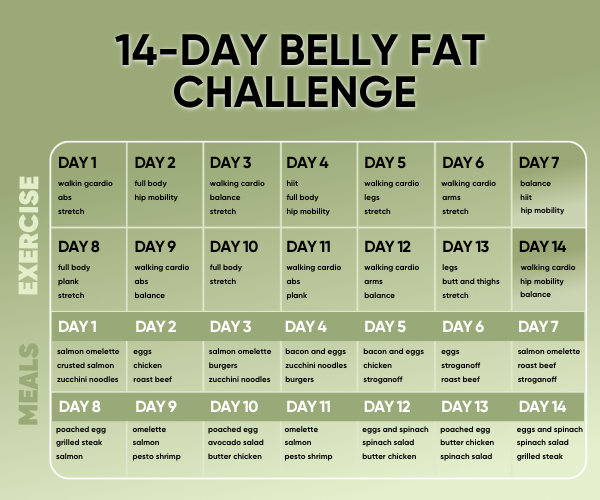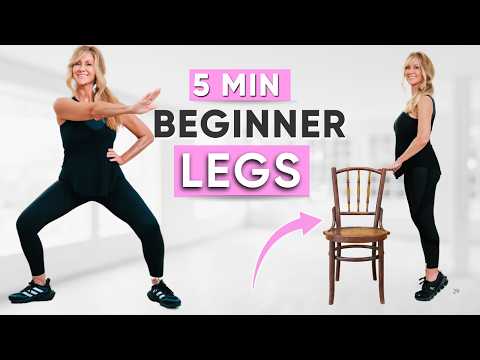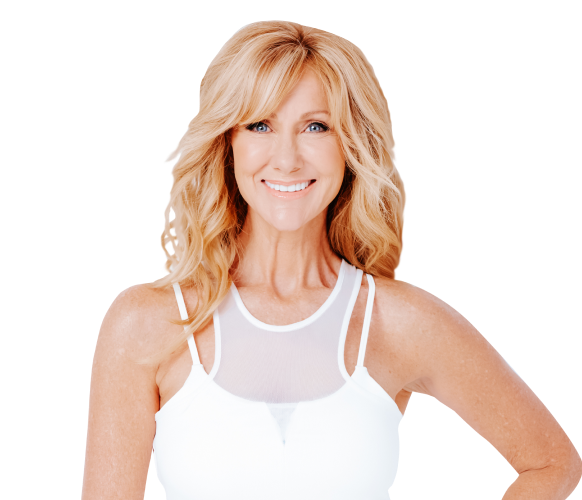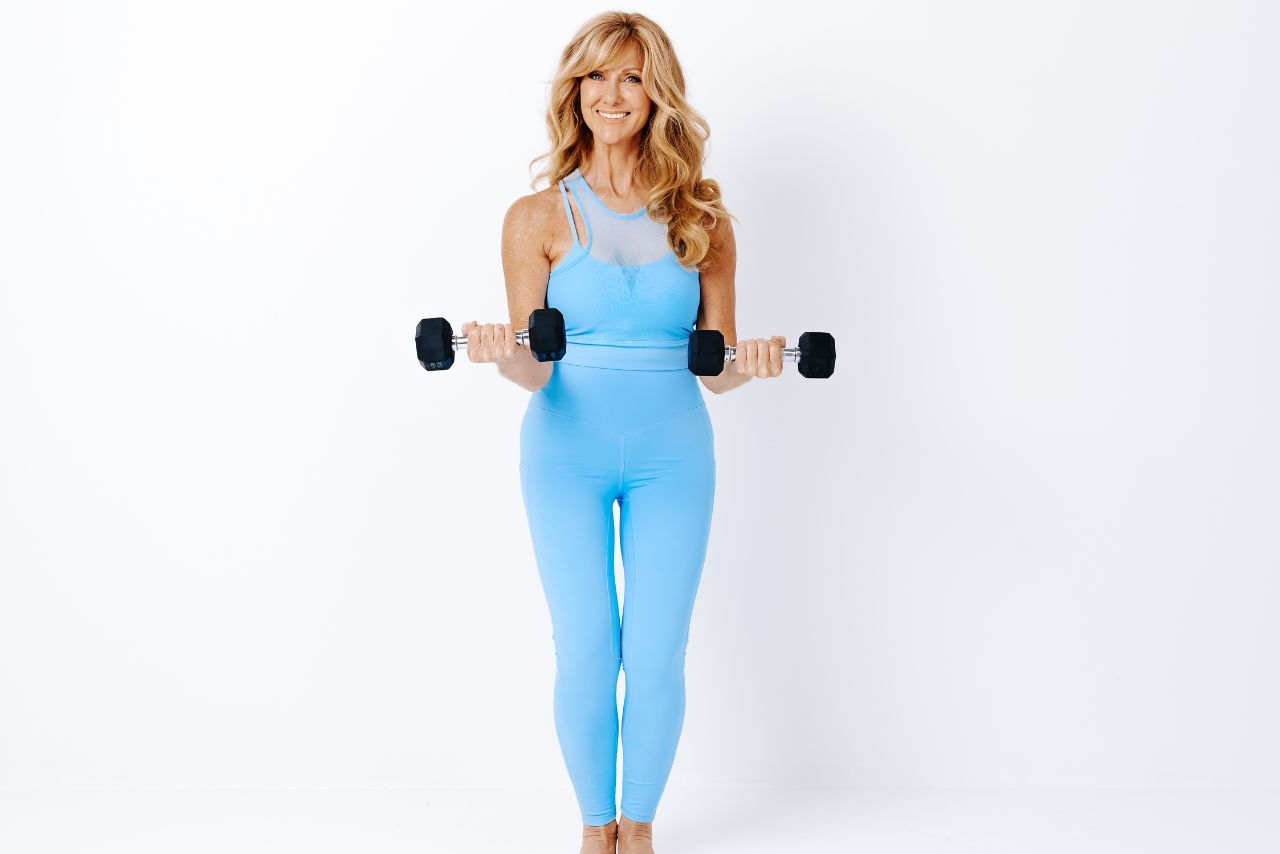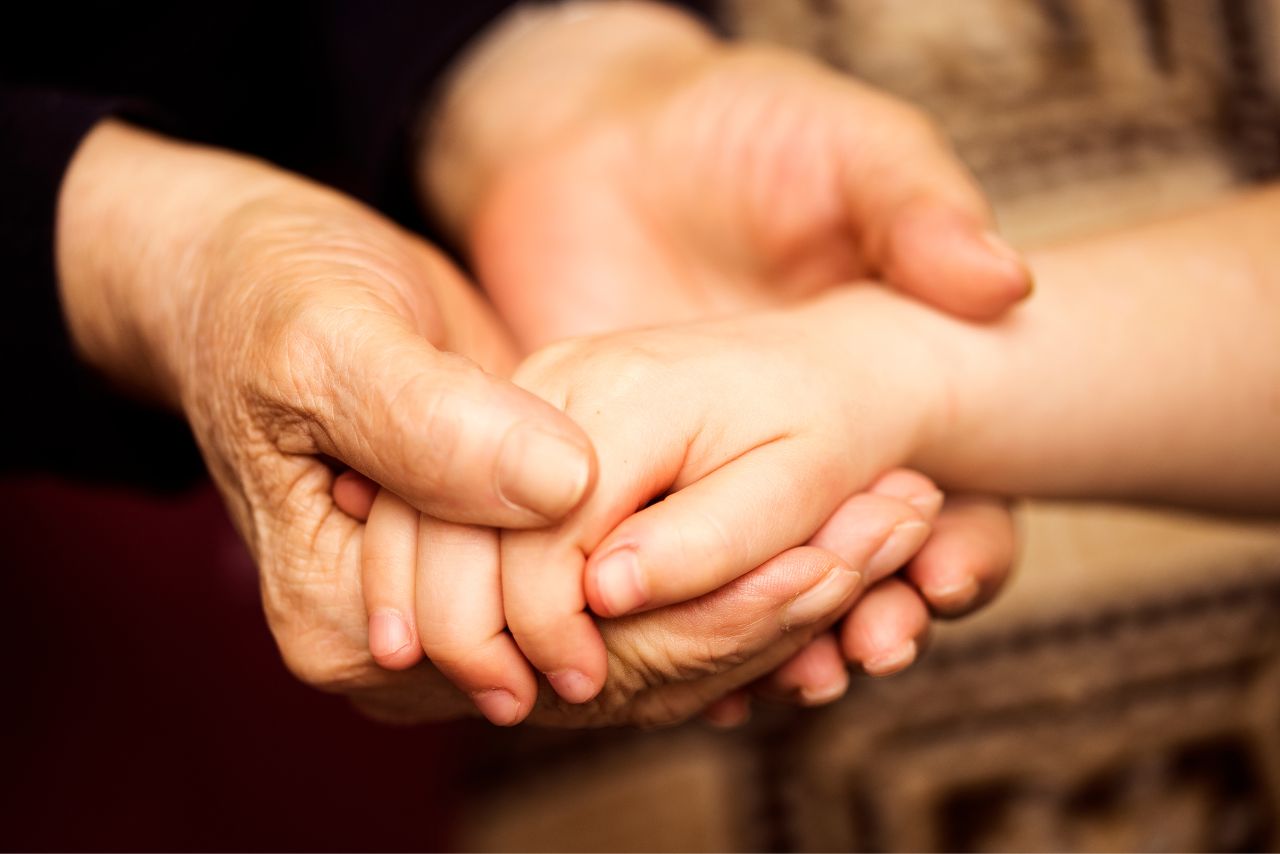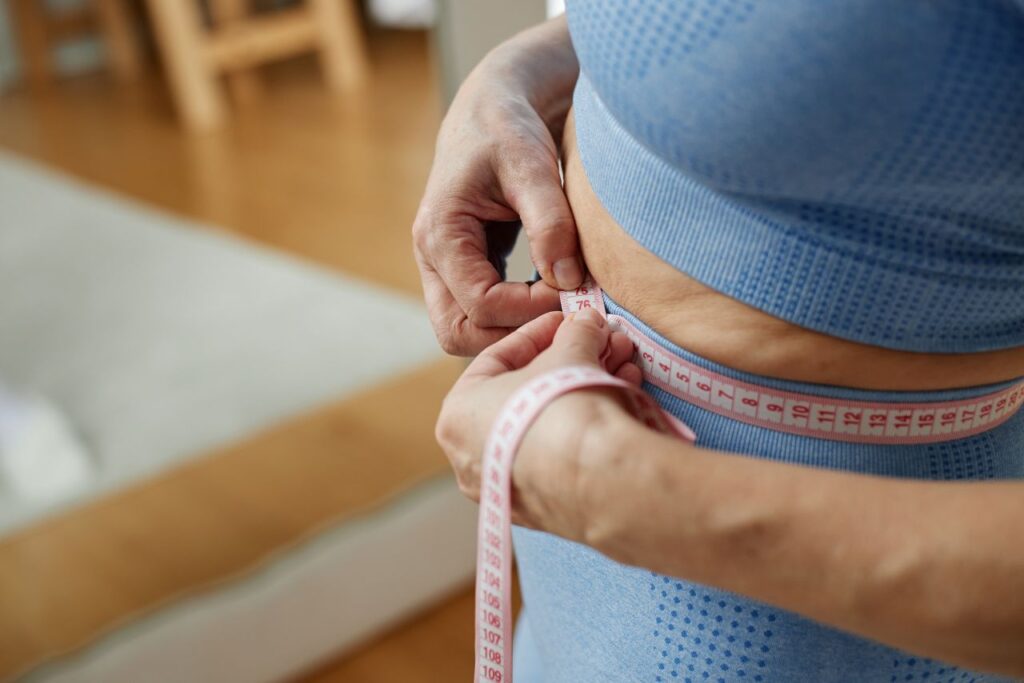
In your 40s and 50s, you may notice that your jeans feel tighter, even though you swear you’ve been eating less. This is a confusing time because “eat less, weigh less” has worked for most of your life.
Now it seems like your body is changing the rules without telling you. That feeling can be frustrating. It can even make you less confident because it seems like nothing you do works anymore.
The truth is that your body isn’t working against you. It is getting used to a new hormonal environment, a different metabolic rhythm, and a whole new energy demand than it had 20 years ago.
Everything gets easier once you know the science behind these changes. You stop feeling like you’ve lost and start working with your body instead of against it. This is where the real progress takes place.
So, let’s explore reasons why you’re gaining weight even when you eat less.
Your Metabolism Naturally Slows Down After 40

One of the main reasons you’re gaining weight even though you’re eating less is that your metabolism has slowed down as you’ve gotten older.
Research from the National Institutes of Health shows that metabolism decreases steadily with age because the body gradually loses muscle mass and becomes less energetically active.
Muscle is what burns calories the best. When you lose weight, your body burns fewer calories even when you’re not doing anything. Cutting calories too much makes your metabolism even slower. It makes your body hold onto fat instead of letting it go, which is a survival response.
Before you turned 40, you could skip a meal or eat less for a day or two and see the scale go down quickly. After age 40, that method stops working because your metabolism becomes more protective.
If you don’t eat enough, your body will try to save energy. That means that even if you eat less, you burn fewer calories, which makes it take a lot longer to lose weight.
Hormonal Changes Shift How and Where Fat Is Stored

One of the main reasons people gain weight in middle age is because of changes in their hormones. Your body changes in ways that feel strange as oestrogen levels drop during perimenopause and menopause.
According to research, lower estrogen levels encourage your body to store more fat around the abdomen than the hips and thighs. Even if your eating habits stay the same, your body behaves differently. Fat distribution changes because your hormones are changing.
Cortisol, a hormone that causes stress, is another factor. During midlife, you may have new stresses and duties, and your sleep schedule may not feel stable anymore. These changes raise cortisol levels, and high cortisol levels make the body store fat for protection, especially around the waist.
This means that you could gain weight even if you feel like you’re not eating enough to get through the day.
Eating Too Little Can Slow Weight Loss
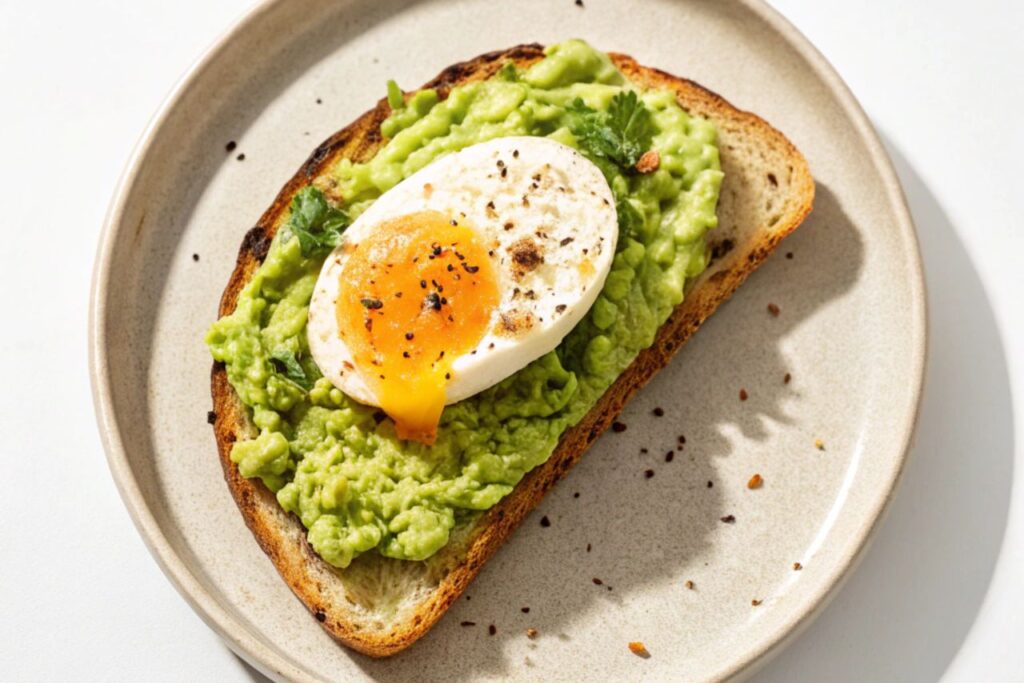
A lot of women make the mistake of cutting back on calories too much. It makes sense. If eating less worked before, it will work even better now. But it’s not true at all.
Harvard Health research shows that not eating enough for a long time slows down the metabolism so much that it’s almost impossible to lose weight. If you don’t eat enough calories, your body thinks there isn’t enough food. When it’s not needed, it stores fat instead of burning it.
Another thing that slows down your metabolism is that you lose muscle faster.
When women over 50 don’t eat enough, they often feel tired, dizzy, have mood swings, and make less progress, no matter how hard they try. The number on the scale might stay the same for months, and you may even acquire extra fat around the waist.
This doesn’t show how disciplined you are. This is your body’s way of protecting itself when it can’t get enough food.
Natural Muscle Loss After 50 Makes Weight Gain Easier

Another invisible reason why people gain weight around midlife is muscle loss. If a woman doesn’t do strength training, she loses about 1% to 2% of her muscle mass every year after age 50.
The Cleveland Clinic explains that sarcopenia, which is age-related muscle loss, leads to slower metabolism, lower strength, reduced mobility, and easier fat accumulation even when you eat less.
So, if two women eat the same amount of food, the bigger woman will burn more calories. Muscle is like the furnace inside your body. When it goes down, so does the number of calories you burn. It gets a lot easier for fat to build up, especially around the middle. This is why cutting calories doesn’t work for women over 50 anymore.
Weight loss depends on building muscle, and you have to keep it up by doing strength training and eating enough protein.
READ ALSO: How to Build Muscle and Get Stronger Over 50
You Burn Fewer Calories During Daily Activities Without Realizing It

You may gain weight even though you’re eating less if you don’t do as much physical activity every day. Simply normal exercise, like walking to the store, carrying groceries, or going up and down the stairs.
As people get older, especially in middle age, they often don’t notice that they move around less. This type of activity, called NEAT, can make up a big part of your daily calorie burn, sometimes as much as 30%, according to the American Council on Exercise. If you don’t move around as much every day, even a little, your total calorie burn goes down.
This is why you might not think your life has changed much, but your body has. Small changes in exercise, like sitting still for longer or walking less quickly, add up over time. You might not have burned as many calories as you think by the end of the day.
When your metabolism slows down and your hormones change, this makes it easy to gain weight, even if you don’t eat much.
Stress Can Trigger Weight Gain Even When You Don’t Overeat

For women, middle age can be one of the most stressful times in their lives. You may have to deal with parents who are getting older, adult children, work duties, changes in your health, and changes in your own emotions.
Stress makes the hormone cortisol rise, which tells the body to store fat. The Mayo Clinic has shown that chronic stress promotes abdominal fat even without an increase in calorie consumption.
The reason for this is that stress can make you gain weight even if you don’t want to or are too busy to eat much.
When your cortisol level stays high, your body goes into protective mode. It keeps fat in your body, makes you burn fewer calories, and makes you want sugar and carbs more.
READ ALSO: How to Manage Stress with Mindfulness and Meditation Over 50
Poor Sleep Disrupts Hunger, Cravings, and Fat Storage

Sleep plays a powerful role in weight regulation. When you don’t sleep well, your hunger hormones become imbalanced. A lack of sleep increases your hunger hormone, ghrelin, and reduces your fullness hormone, leptin.
The Sleep Foundation confirms that adults who sleep poorly tend to consume more calories, have more cravings, and store more fat, especially around the belly.You may be eating less overall, but tiredness pushes your body to hold onto fat anyway.
After reaching midlife, many women say they wake up several times at night, have night sweats, or have trouble falling asleep. All of these changes have a big effect on your metabolism. When you don’t get enough sleep, your body saves fat to stay alive.
READ ALSO: What to Do When You Can’t Sleep: Practical, Science-Backed Tips for Deep Rest
Insulin Resistance Becomes More Common After 50

Another cause of weight gain that isn’t always taken into account is insulin resistance. This is more common after midlife because of changes in hormones, stress, inflammation, and muscle loss.
If your cells stop responding to insulin properly, your body stores more fat, even if you are not eating as many calories.
According to the CDC, insulin resistance can make it very hard to lose weight, even if you eat few calories.
Some signs are feeling tired, wanting sweets, having extra fat around the middle, skin tags, or brain fog. You don’t need to have more willpower to fix this metabolic problem.
Diet alone is not enough to make insulin work better. It needs healthy meals, regular exercise, strength training, and better sleep.
How VitaliT App Helps You Break the Cycle and Finally See Progress
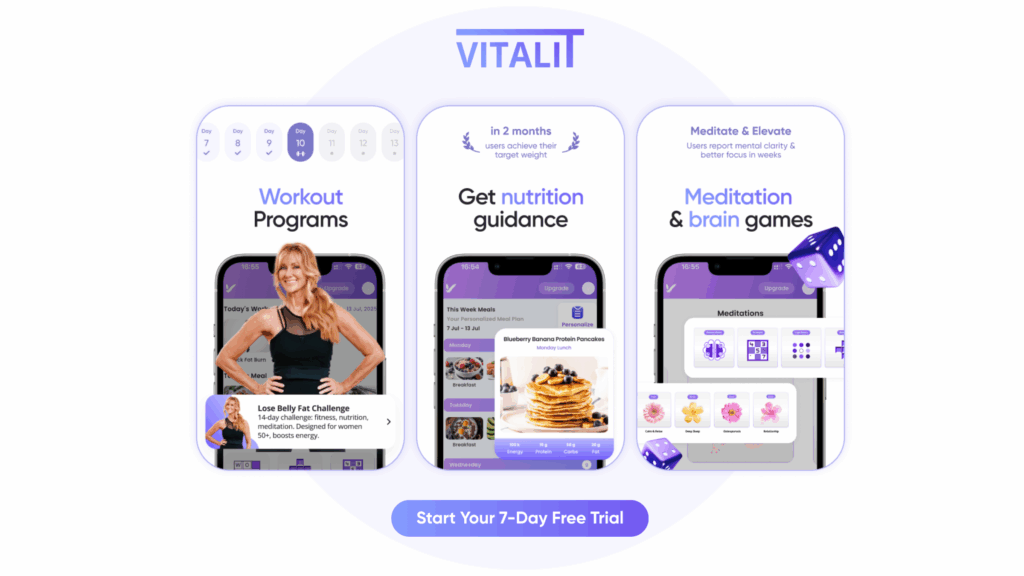
VitaliT makes midlife weight loss simpler by giving you exactly what your body needs right now, all in one place.
The app combines science-backed strength training to rebuild the muscle that boosts your metabolism, protein-rich meal plans that support balanced hormones, and calming stress-reducing practices that help lower cortisol so your body finally feels safe enough to release fat.
Every feature inside VitaliT aligns with the real reasons women gain weight even when they eat less, turning guesswork into a clear, supportive path you can follow with confidence.
If you’re ready to feel stronger, lighter, and more in control again, start your free trial today and let VitaliT guide you every step of the way.
Final Thoughts
Gaining weight even when you eat less feels unfair, but it isn’t a sign of failure. It’s a sign that your body is changing and asking for new support.
If your hormones change, your energy drops, and your stress level goes up, your body goes into “preservation mode.” Because it sees these signals as a possible threat to your survival, it tries to keep you safe by storing more fat and slowing down your metabolism
Once you understand how metabolism, hormones, sleep, and stress interact, you stop punishing yourself with restriction. You begin nourishing your body instead. You build strength instead of fear. You reclaim your energy and confidence piece by piece.
Remember, you are not failing. You are not lacking discipline. As your body changes, it needs support, not limits. With the right nutrition, regular strength training, and gentle care, it’s easier to lose weight.
You deserve to feel at home in your body again. And with the right support, you absolutely can.
Frequently Asked Questions
Healthy foods are important, but hormones, metabolism, and muscle mass are stronger factors during midlife. Even a healthy diet may not create weight loss without strength training, protein, and enough total calories.
Yes. Eating too little slows your metabolism significantly and makes fat loss harder. Your body interprets severe restriction as a threat and holds onto fat.
When estrogen levels drop, fat storage moves to the belly. Stress and sleep changes add to this, making belly fat more common even when you’re eating less.
No. With strength training, balanced meals, better sleep, and gentle stress management, midlife weight gain becomes much easier to control and reverse.
Most women start feeling better within two to three weeks and begin seeing visible changes within six to eight weeks of consistent habits.

